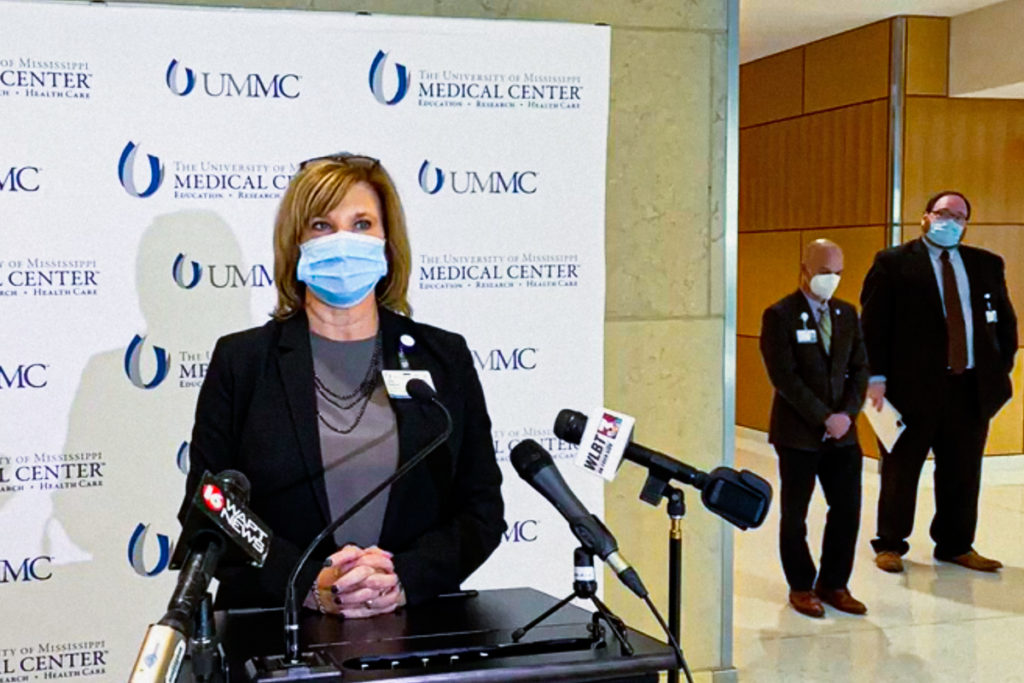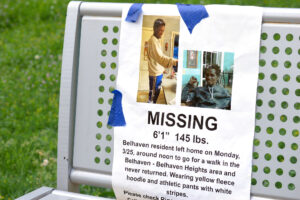Until this past summer, University of Mississippi Medical Center emergency room nurse Lacey Ward had never questioned her career path. Then, chaos and death overwhelmed her workplace during the Magnolia State’s mid-year COVID-19 wave.
“The numbers were so bad it made me question if this is what I was willing to do, because it was so defeating to come in and have so many people that were so sick and that were dying and couldn’t be with their loved ones,” Ward, who has worked at UMMC for three years, said at press conference in Jackson today.
“When you’re on the phone and letting somebody say goodbye to their family member and you have to be there for that private moment and you’ve done everything you can, it’s very defeating to see people having parties and gatherings.”
In cases and hospitalizations, Mississippi is now back at summer levels just days before Thanksgiving, which could provide fertile soil for COVID-19 super-spreader events if families across the state gather in large numbers.
Dr. LouAnn Woodward, the vice chancellor for health affairs and the dean for the UMMC school of medicine, told reporters today that she believes the governor’s current COVID-19 strategy is failing.
‘We Should Have a Statewide Mask Mandate’
On Sept. 30, Gov. Tate Reeves allowed the statewide mask mandate, which had been in effect for almost two months, to expire. He credited it with helping beat back the summer surge, but said he believed Mississippians would continue to wear masks “without the heavy hand of government” requiring them.
Instead, many Mississippians abandoned mask-wearing in public, and within weeks cases, and then hospitalizations, and then deaths began climbing again. By mid-October, Reeves was re-implementing some mask mandates, but only in a fraction of counties that were experiencing the worst surges.
In some of those counties, cases fell after the governor instituted the local mask orders, while cases continued climbing in others. Statewide, though, COVID-19 cases have continued to surge. The seven-day daily average for new cases, which was 500 on the day Gov. Reeves let the statewide mask mandate expire, is now 1,283.
On Nov. 21, Mississippi broke its one-day record for new cases, with 1,972 reported. The prior record, which the state hit at the summer peak on July 30, was 1,775.
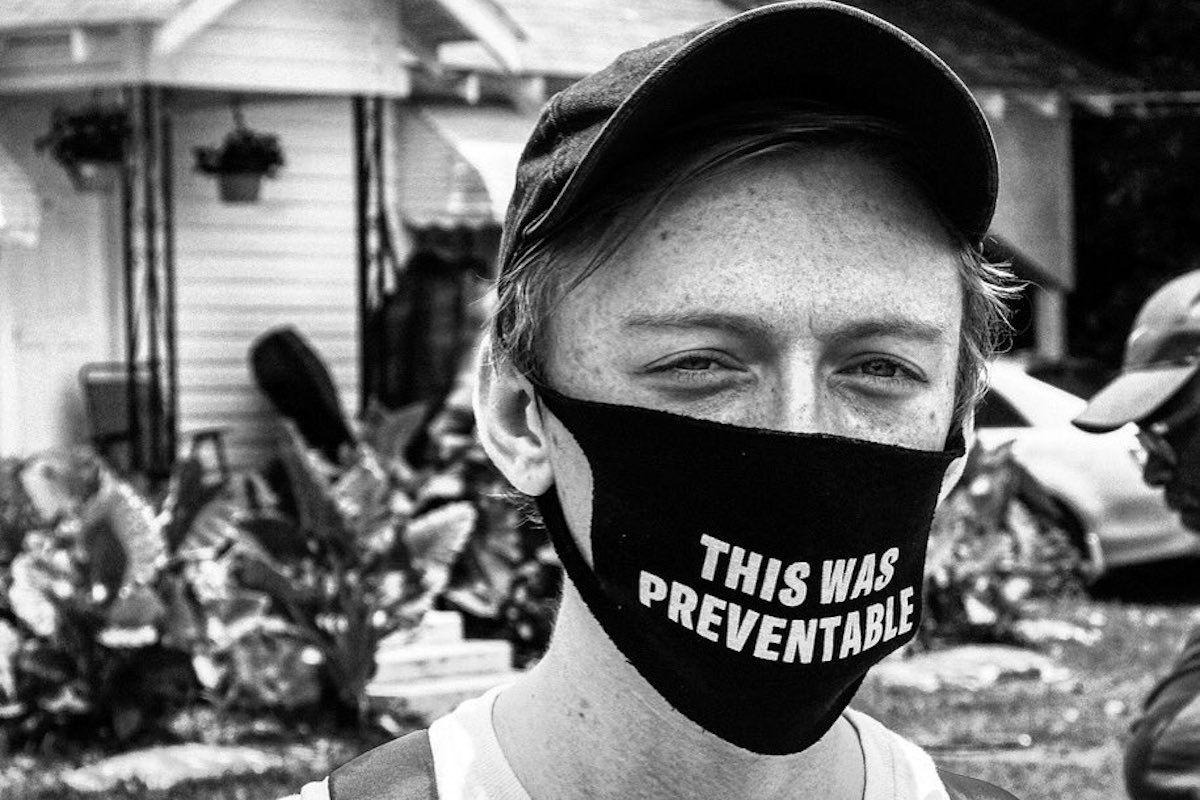
“I think that from the standpoint of myself and my own opinion and the leadership here at the medical center, we very much believe we should have a statewide mask mandate,” Woodward said today. “Even with a statewide mask mandate, not 100% of people will comply. But we do have reasonable evidence to believe the county-by-county approach is not working. It’s maybe helping, but it’s certainly not doing what we need it to do.”
At UMMC, Woodard said, “all of our beds are full.”
“It is not turning these numbers around for us,” she said, referring to the county-level mask orders. “And the other reason is with the governor being the highest level of state official in the state of Mississippi, I think that sends a big signal for that position to say, ‘We are at a critical point, people—we need to have a statewide mask mandate.’ … What we have been doing hasn’t turned this around.”
Gov. Reeves Criticizes Health Leaders on Mask Mandates
In an interview on WLOX on Saturday, though, the governor criticized health officials who are pushing for a renewed statewide mask mandate, pointing out that cases are rising nationwide—even in states with mask mandates still in effect.
“If that was the panacea, if statewide mask mandates quashed the virus as some would have you believe—And quite frankly, one of the things that is very disappointing to me is that even some of our leading medical experts act as if a statewide mask mandate would solve all of our problems,” Gov. Reeves said. “And that is simply not true.”
The Mississippi Free Press is not aware of any leading public health experts claiming that “a statewide mask mandate would solve all of our problems.” Dr. Woodard, for example, noted today that some Mississippians would still refuse to comply, and the state health officer has repeatedly cautioned that while masks prevent much transmission, they will not prevent all infections.
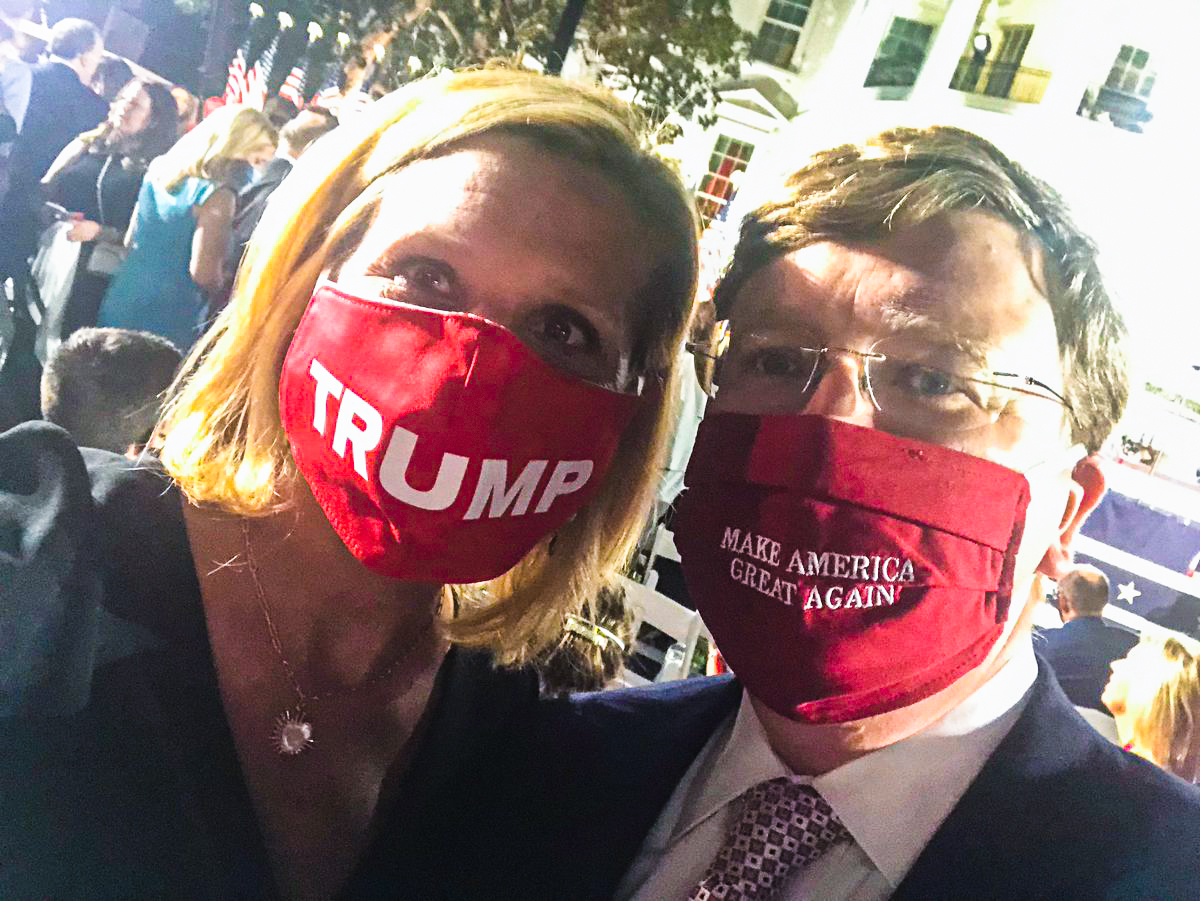
“The fact of the matter is, the best way to slow the spread of the virus is to recognize and be honest with one another that there is no guarantee and no one size fits all. There is no button we can all push to guarantee that we’re not going to have significant numbers of new cases,” Gov. Reeves said today.
Research, though, has repeatedly found that when more people wear masks, the virus spreads far more slowly. Many states with mask orders, including Mississippi during the late summer and early fall, have seen slower rates of spread or even a reduction when a mandate was in effect than states without public masking orders.
‘We Are Headed in the Wrong Direction’
The UMMC vice chancellor and the young emergency room nurse were far from the only health-care professionals in the capital city who voiced dismay over the reluctance of broad swaths of the state to voluntarily follow public health guidelines today.
Over at the State Capitol Building, Mississippi State Health Dr. Thomas Dobbs testified before senators today at a Senate Public Health and Welfare Committee. He said the total number of COVID-19 cases, deaths and hospitalizations is already set to surpass the summer peak—which, for now, remains the most devastating wave of the pandemic so far.
“It’s going to be more than the summer for sure. We are headed in the wrong direction, and we’ve got a lot of negative headwinds to face,” Dobbs said.
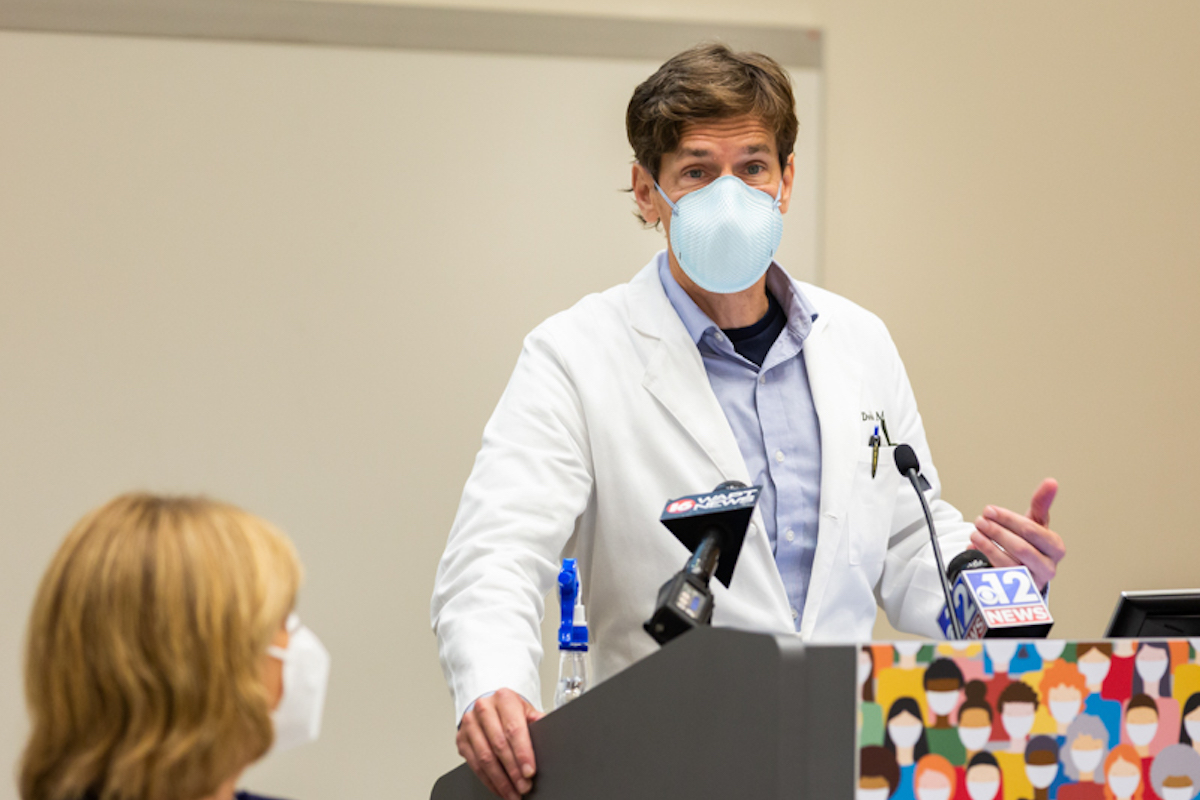
The state health officer, who since the spring has relentlessly urged Mississippians to wear masks and practice social-distancing guidelines, told senators he has grown frustrated.
“I can tell y’all, I’m just exhausted trying to convince folks to do stuff. And it’s just going nowhere. It’s just going nowhere,” the state health officer told the legislators.
Mississippians could prevent coronavirus transmission while doing “zero harm to the economy” with simple, but inconvenient steps, Dobbs told senators, but that is not what has happened.
“We have chosen, very clearly, to prioritize social events over (preventing) disease transmission,” the exasperated doctor told the committee. “And part of it is we are tired. And some have chosen to minimize it.”
‘Weird Theories’
In DeSoto County, numerous local officials have downplayed the threat of COVID-19, including the sheriff, Southaven’s mayor, and three current Mississippi House representatives. Some have pushed false conspiracy theories about the virus’ origins, too. Despite widespread transmission, the sheriff has refused to enforce Gov. Reeves’ mask mandate for the county.
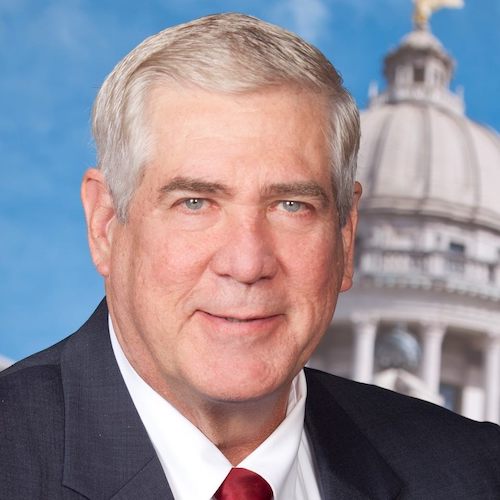
During today’s hearing, Sen. Kevin Blackwell, the chairman of the DeSoto County Republican Party, asked Dr. Dobbs about a common myth that has spread among residents in DeSoto County and elsewhere in the state. That myth, which the DeSoto County coroner has even pushed, claims that the Mississippi State Department of Health is inflating the number of deaths attributed to COVID-19.
“We pull the medical records and make sure it was from a COVID-19-related illness,” Dr. Dobbs said, citing “weird theories” like people claiming that MSDH counted a COVID-19 positive individual’s bicycle crash as a COVID-19 death.
“It’s always a Facebook phantom sort of thing that’s making the rounds,” Dobbs said.
For months, the state health officer has repeatedly shot down such claims, noting that MSDH does not include deaths in the COVID-19 toll just because an individual was positive for the virus. The virus itself must be the primary cause of death, he said.
Dobbs pointed out that while the state has officially reported 3,676 deaths from COVID-19, the actual toll is likely higher. More than 5,000 Mississippians have already died this year than on average in past years, he said.
The state health officer estimated that only about 15% of Mississippians have been infected so far. If everybody in the state got COVID-19, though, at least 30,000 more people would die.
‘We Could Not Handle a Surge of More Patients’
Dobbs and other health leaders are worried that Thanksgiving gatherings could bring a significant surge in new COVID-19 cases.
“We are extremely concerned about the Thanksgiving holidays as well as the change with most college kids coming home after the Thanksgiving break,” Dr. Woodard said at UMMC today. “We are concerned that the case numbers will continue to go up. Here at this hospital, we could not handle a surge of more patients coming at us. We are at capacity as we speak.”
She said the hospital is already at “a complete replication of what happened this summer,” with emergency-room beds staying full.
“We get a little bit of a break in any given day for a few hours and then the patients that are waiting on those beds in our emergency department immediately backfill those beds,” Woodward said.
But beds are not UMMC’s biggest concern right now, she said: the workforce is.
“All of the folks that have been with us for the long haul are very tired, very fatigued and very weary,” Woodard said, saying the medical center is limited in what it can do to expand its workforce.
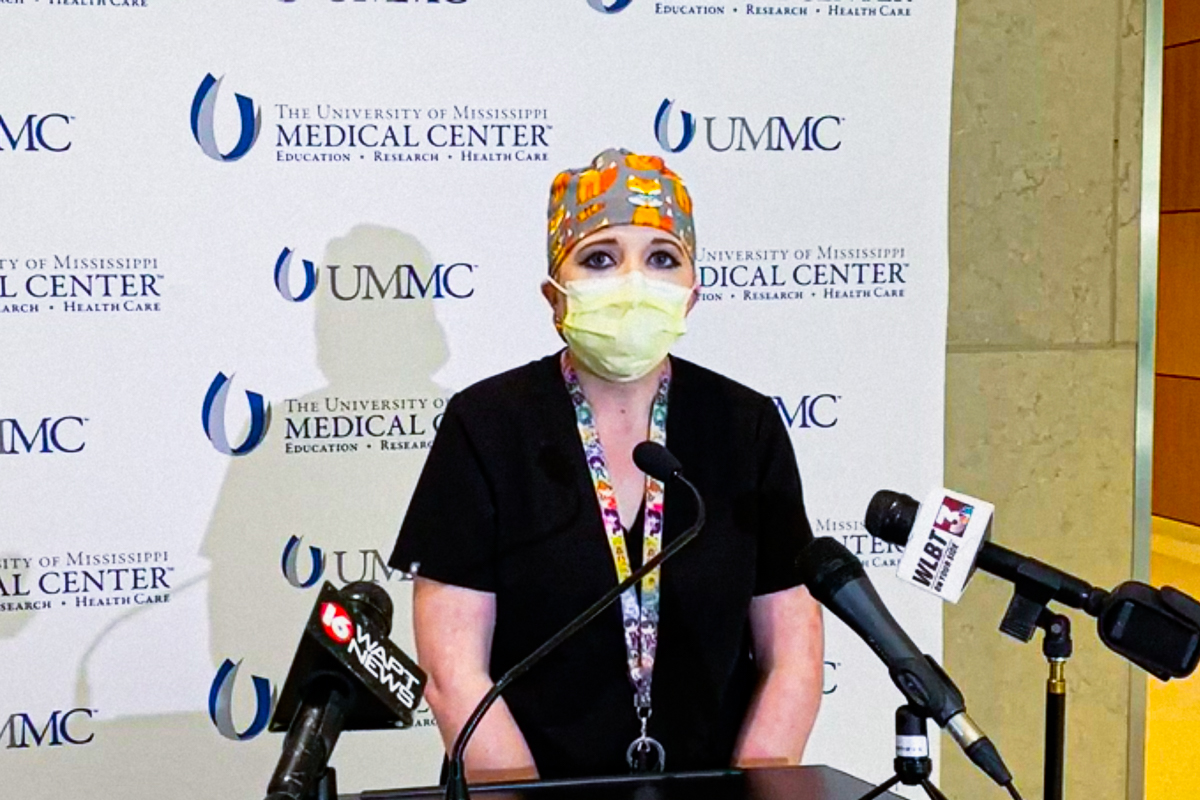
“If the numbers rise, if the demand on the hospital here worsens, … we simply will get to a point where we are out of beds and out of space, and we cannot safely make any other adjustments,” the UMMC vice chancellor said. “And then, number two, even if we could line this lobby full of beds, we don’t have the staff to take care of the patients. So those are really the two biggest pain points, physical beds and physical space. And honestly the staffing issue is the highest hurdle.”
Ward, the emergency-room nurse, said she understands that many Mississippians are tired of social-distancing rules that prevent them from seeing their families and other loved ones.
“We all want to be with our families. I want to be with mine. I have three boys, and I’m terrified every day that I’m going to give it to them,” she said. “We’re doing our best to take care of every person that comes in the door.”
‘A Voice Crying in the Wilderness’
Over at the Capitol today, Dr. Dobbs told senators that he had cancelled his Thanksgiving plans to fly to Washington, D.C., to visit his son in order to “practice what we preach.” If Mississippians do have gatherings, though, they should “do it small and do it outdoors,” he said.
The state health officer told senators that he was frustrated by the black-and-white thinking that has driven so many conversations around COVID-19. The choices are not “freedom and business versus lockdown and oppression” despite the political rhetoric that many have bandied about, he said.
“That’s just a crazy dichotomy. If we would only have small gatherings, if we wouldn’t do unstructured school stuff like choir, and if we would all wear masks in public or just stay apart from one another and (gather) outdoors, we wouldn’t be having this conversation,” Dobbs said.
Mississippi, he said, has failed to move toward a “healthy middle.”
“That’s one reason Sweden’s doing better,” he said. “They’re doing worse than other Scandinavian countries, but they’re staying away from one another, they’re doing outdoor stuff, they’re listening to public health and guidance.”
Unlike its neighbor nations, Sweden never implemented a nationwide lockdown, but instead issued strong public health guidance that citizens have largely followed.
“And it’s a cultural thing, because they do respect their government institutions and their public-health folks,” Dobbs said.
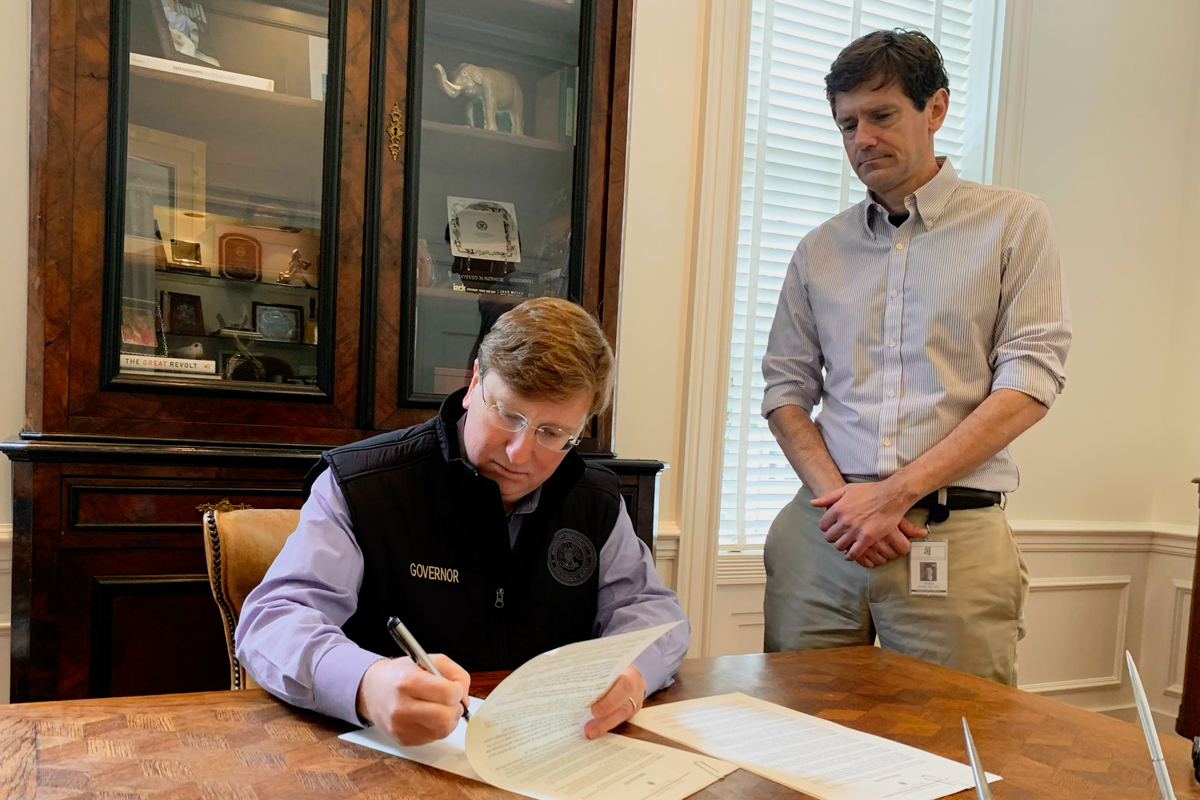
The state’s top doctor said he has often felt like “a voice crying in the wilderness” as he has pushed for greater efforts to tamp down the spread of COVID-19 efforts from state leaders and citizens alike.
“But right now, we’ve really switched to (saying), ‘Take care of yourself and take care of your family, because no one else is going to do it for you right now,’” he said grimly.
During a Nov. 12 COVID-19 roundtable with members of the Mississippi State Medical Association, Dobbs and other state health leaders warned that people who attend big family gatherings for Thanksgiving could be planning small funerals by Christmas.
‘Markers’ of the Beast
During today’s committee hearing, the state health officer said that, while doctors have gotten better at treating people for COVID-19 since the summer wave, it is not enough to stop the medical system from once again becoming overwhelmed. Already, many hospitals across the state are out of ICU beds or running low on overall bed capacity.
“It’s very much kind of like a water faucet and a mop analogy. We’re getting better at the mops, but we have the faucet wide open,” he said. “Since we don’t have the collective will to pull back in our behaviors, it’s really going to take a vaccine.”
Sen. Chad McMahan, who represents parts of Lee and Itawamba counties, acknowledged the state health officer’s difficulties in trying to share a public-health message amid a politicized pandemic.
“It’s a no-win situation for you,” the Republican senator said.
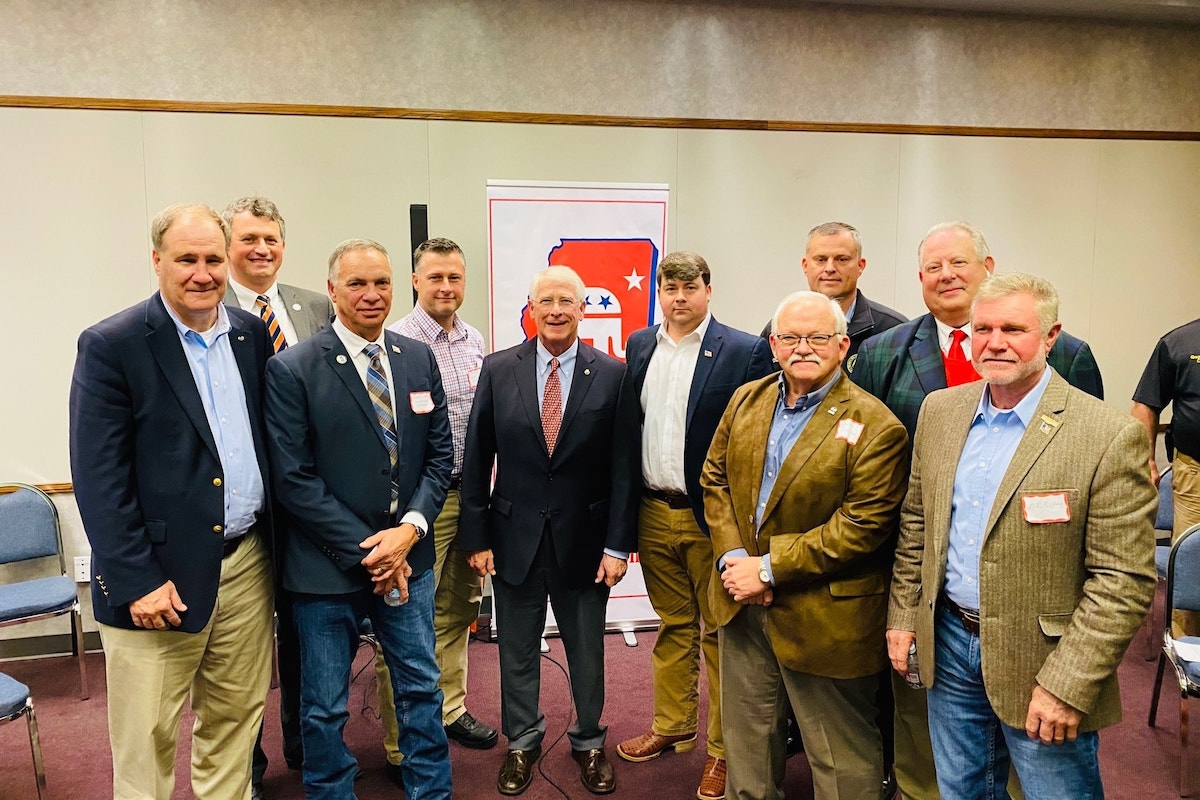
Then, McMahan asked Dobbs about another conspiracy theory that has made the rounds on social media—this one about vaccines.
“I get a lot of questions from constituents about these vaccines. Are any of these vaccines going to have nanotechnology in them associated with them?” the senator asked.
The vaccines will contain “microparticles” that will be “smaller than a cell or smaller than a bacteria,” the state health officer replied.
“Is it biological or mechanical?” McMahan asked.
“It’s like an organic molecule. Like a little fat particle almost,” the state health officer said.
“What about any type of electronic or silicone-based markers? Will there be anything like that in these vaccines to your knowledge?” the senator continued.
Dobbs shook his head.
“No sir,” he said.
McMahan was referring to a false conspiracy theory that has been spreading online since at least April, claiming that Microsoft founder Bill Gates and a coalition of shady international figures plan to use a COVID-19 vaccine to inject the world population with a microchip to regulate global activity.
The conspiracy theory claims the fictitious microchip is the biblical “Mark of the Beast” foretold in the Book of Revelation.
After Dobbs shot down the theory today, McMahan made it clear that he was only asking on behalf of residents in his district.
“I’m not in that camp, but I will say I get a lot of questions about it, so I wanted to try to be well-informed to answer my constituents’ questions about it,” McMahan said.
Senate Public Health and Welfare Committee Chair Hob Bryan, a Democrat, closed out Dobbs’ testimony by thanking him for attending.
“Dr. Dobbs, we appreciate you coming. I know it’s a busy time for you,” he said. “I don’t know if you’ve thought about this or not, but maybe if you as the public health officer would just explain to the public the steps that they could take, maybe that would have a positive effect.”
Dobbs chuckled.
“I’ll keep trying.”
Correction: Parts of this story originally misspelled Dr. LouAnn Woodward’s name. We apologize for this error.


